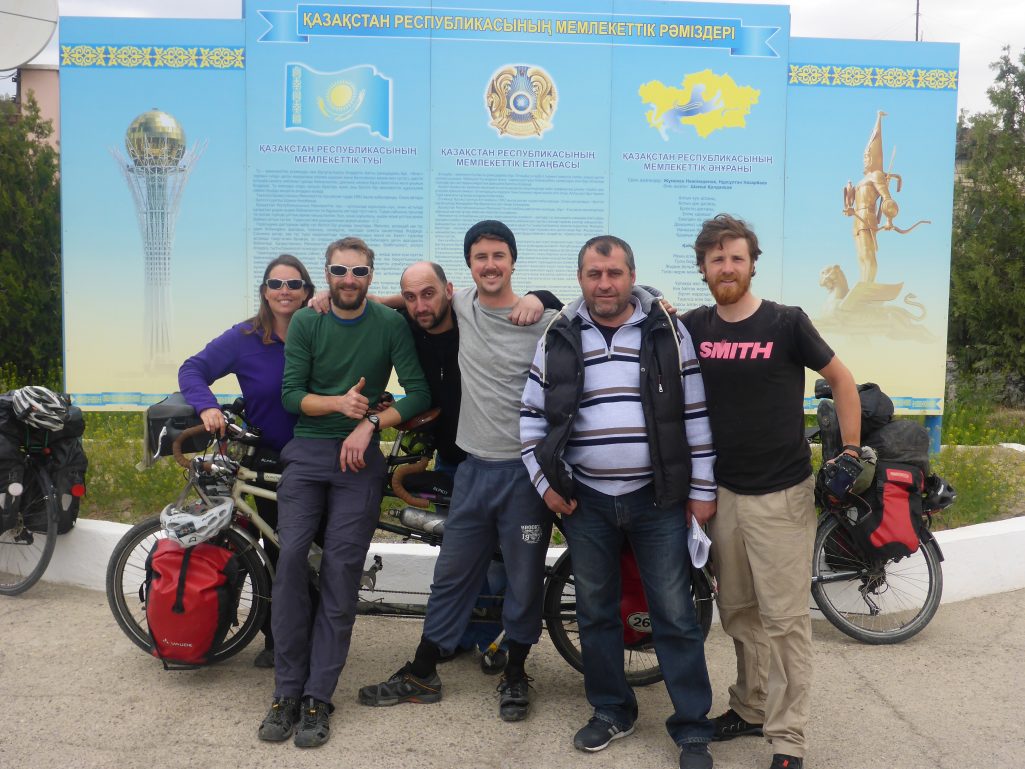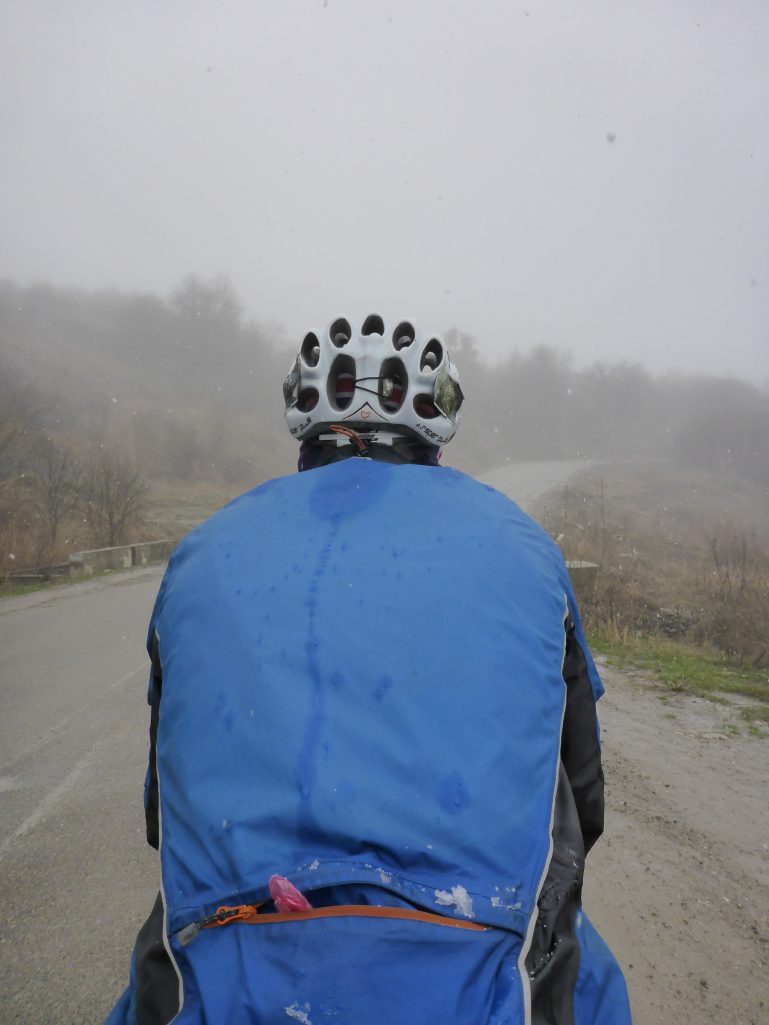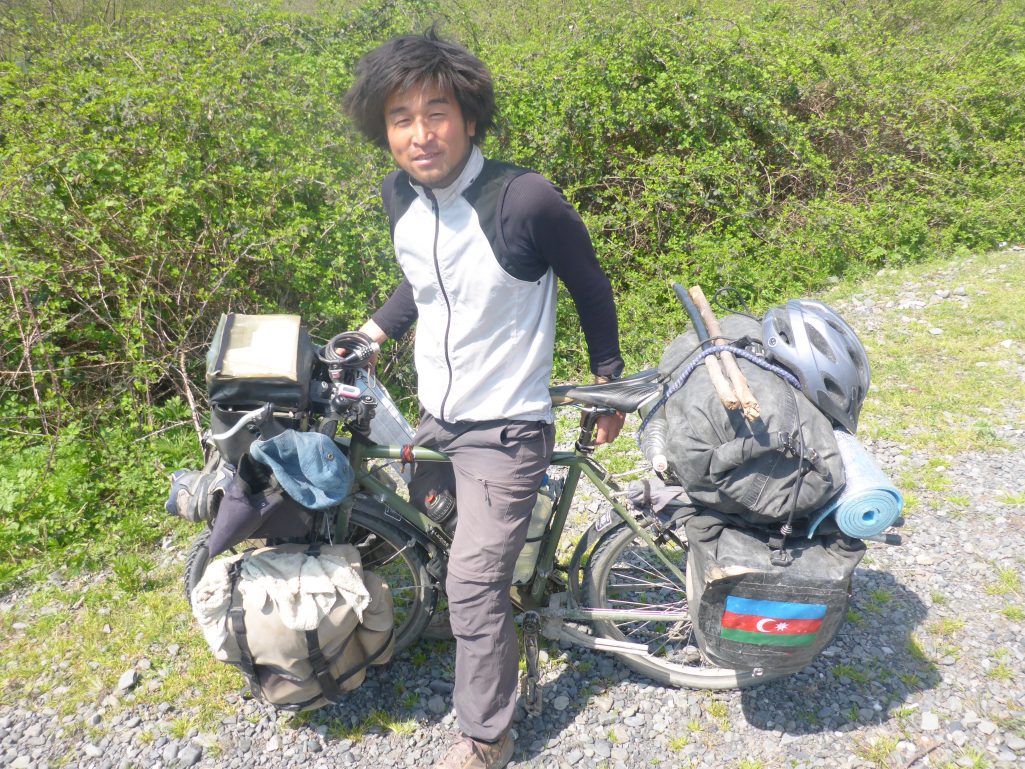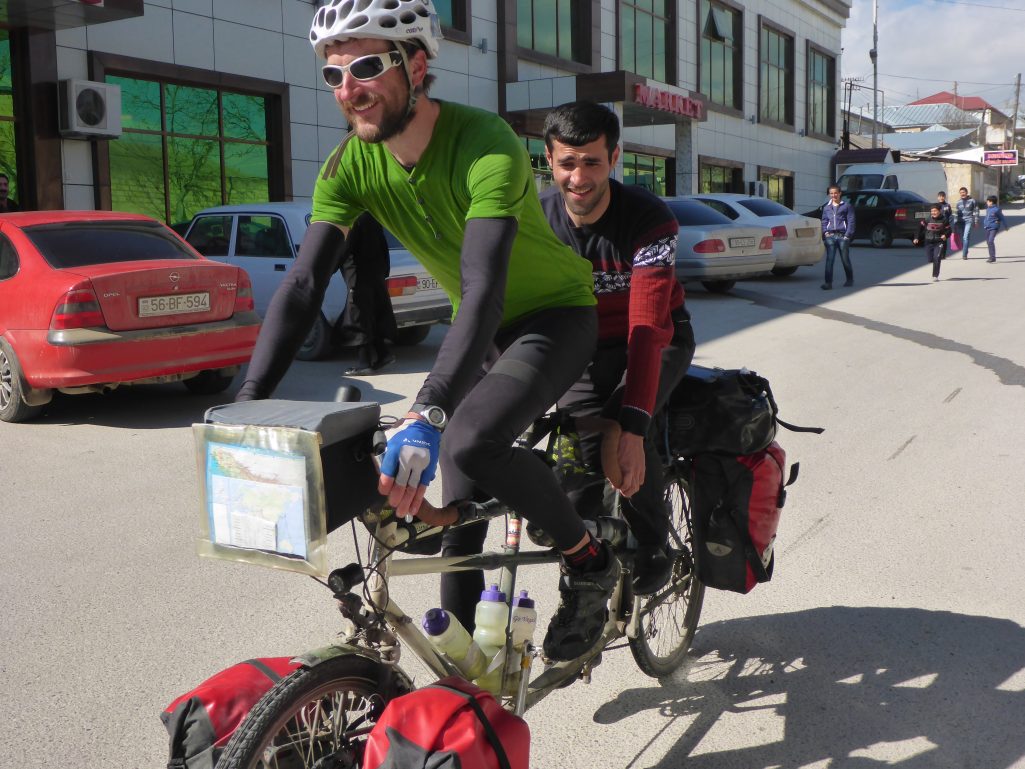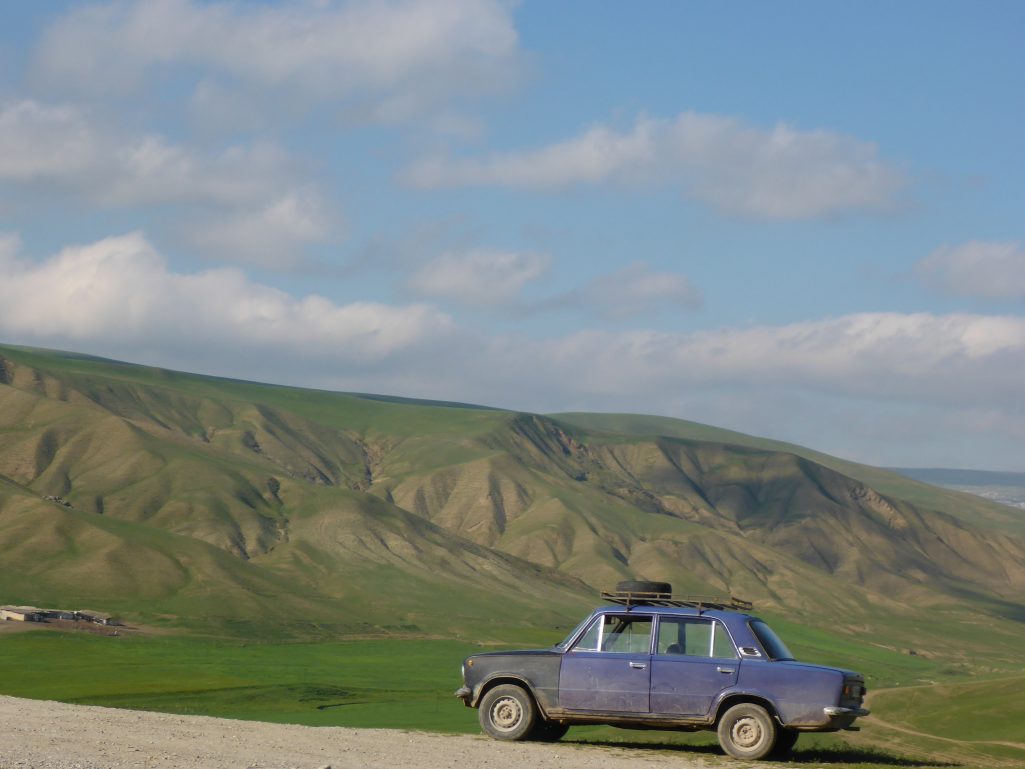Escape from Baku

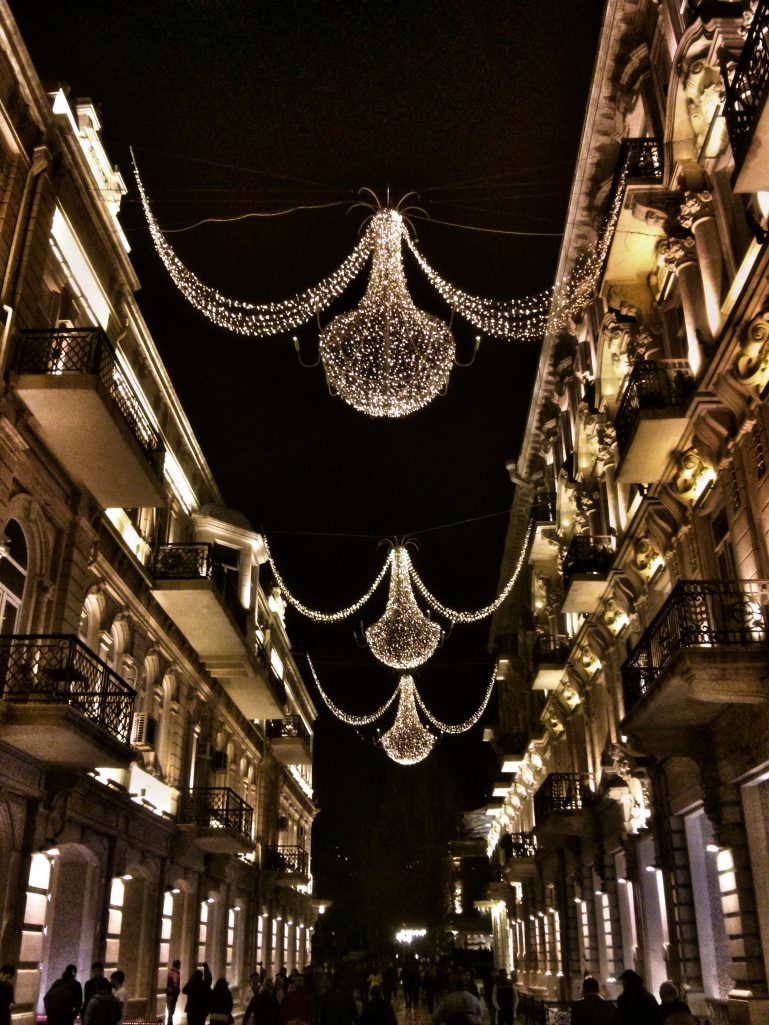
There was a rumour that the restrictions on visas for UK citizens visiting Iran was only temporary and would be lifted once the much publicised nuclear talks had been completed. Sadly it looks like this isn’t the case, or at least nothing has changed yet so our Plan A route to Central Asia is well and truly closed.
Plan B was to take a boat from Baku to Turkmenbashi in Turkmenistan. Often referred to as the North Korea of Central Asia due to its former dictator’s unusual behaviour (he changed the names of some of the months to include his family’s names, a book of his famous sayings is compulsory reading for all citizens, there is even a gold statue of him in Ashgabat that revolves to always face the sun). But Turkmenistan is the 7th least visited country in the world, not helped by yet more restrictive visa conditions. As with Iran, to obtain a tourist visa we’d need to be on an expensive guided tour. The alternative is a 5 day transit visa but with 900km to cover and a boat crossing that could use up 2-3 of these days it would be hard to cover this distance by bike so we reluctantly rule this route out.
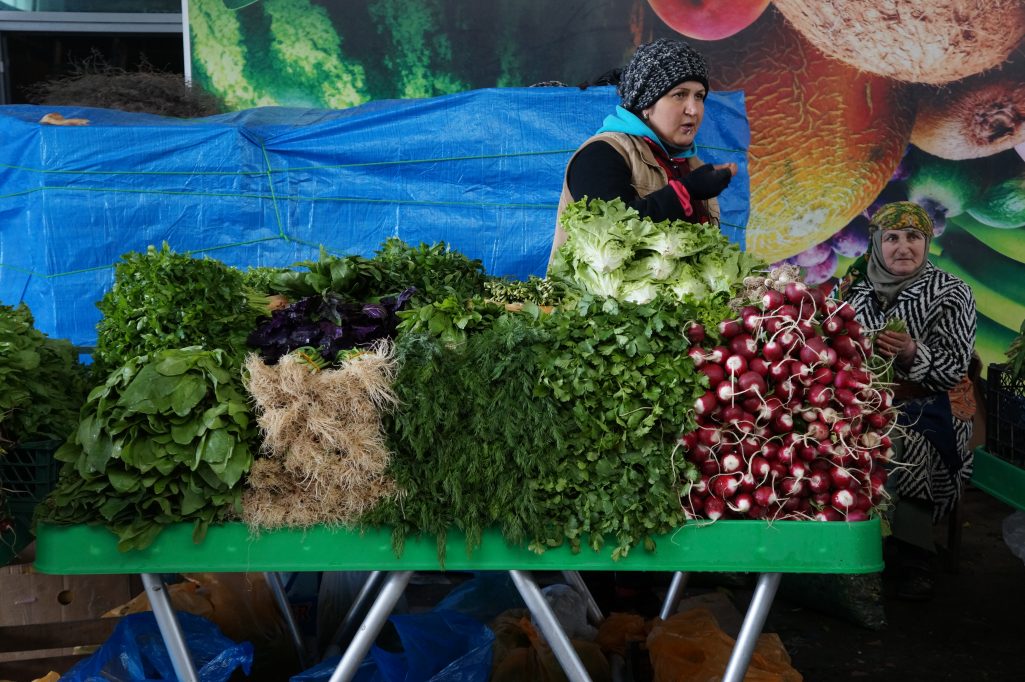
So our Central Asia plan C is to catch a boat across the World’s biggest lake, the Caspian Sea, up to Kazakhstan (no visa needed for a 2 week stay) then ride down into Uzbekistan through vast amounts of desert.
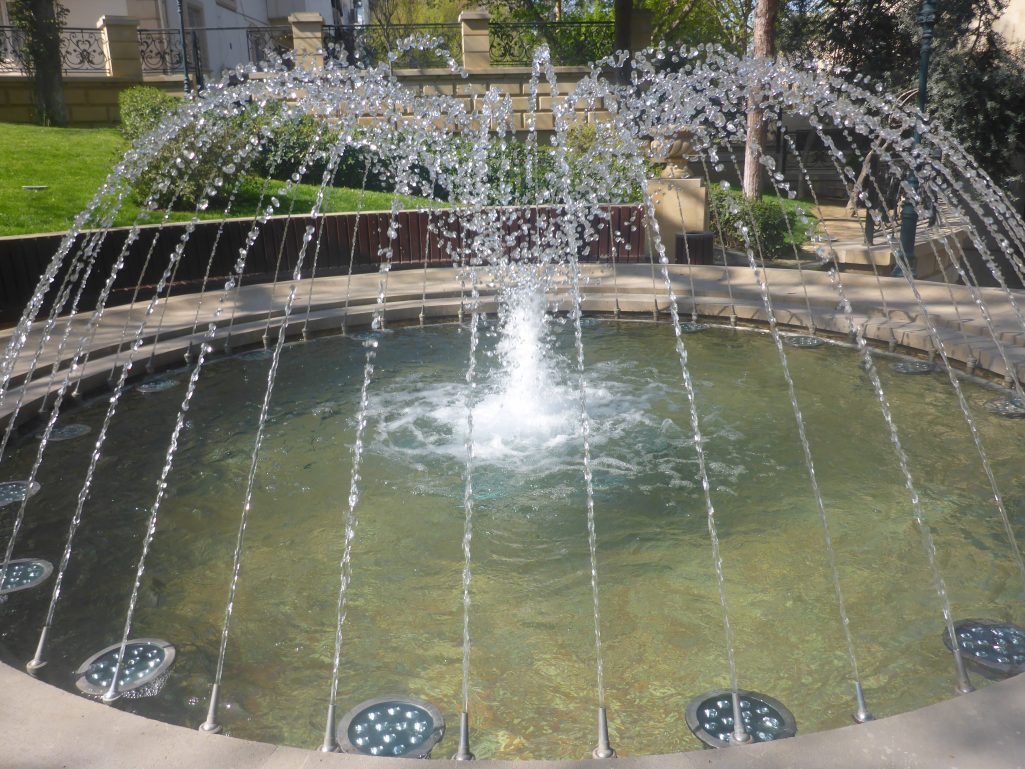
On an extremely windy day, for which Baku is well known, we struggle against 70kph gusts up to the Uzbek embassy and meet with a very grumpy Consul. He reluctantly takes our completed forms and tells us he’ll be in touch within 8-10 days once the visas are ready. Longer than we expected but we hope he’s exaggerating. The embassy is on an unassuming residential street and on our way out we bump into an exasperated motorcyclist who has spent the last hour trying to find it and point him in the right direction.

The next day we find the Tajikistan embassy as this is our destination after Uzbekistan. Here the reception couldn’t be more different with a very friendly and helpful Consul who tells us we should be able to collect these Visas within 4 days. The price is less than half that of the Uzbek visa at $35 instead of $75 and we can apply for up to 45 days compared to only 30 days for Uzbekistan. As a representative of their country and first point of contact for many foreign travelers it’s the Tajik who leaves the much better impression.
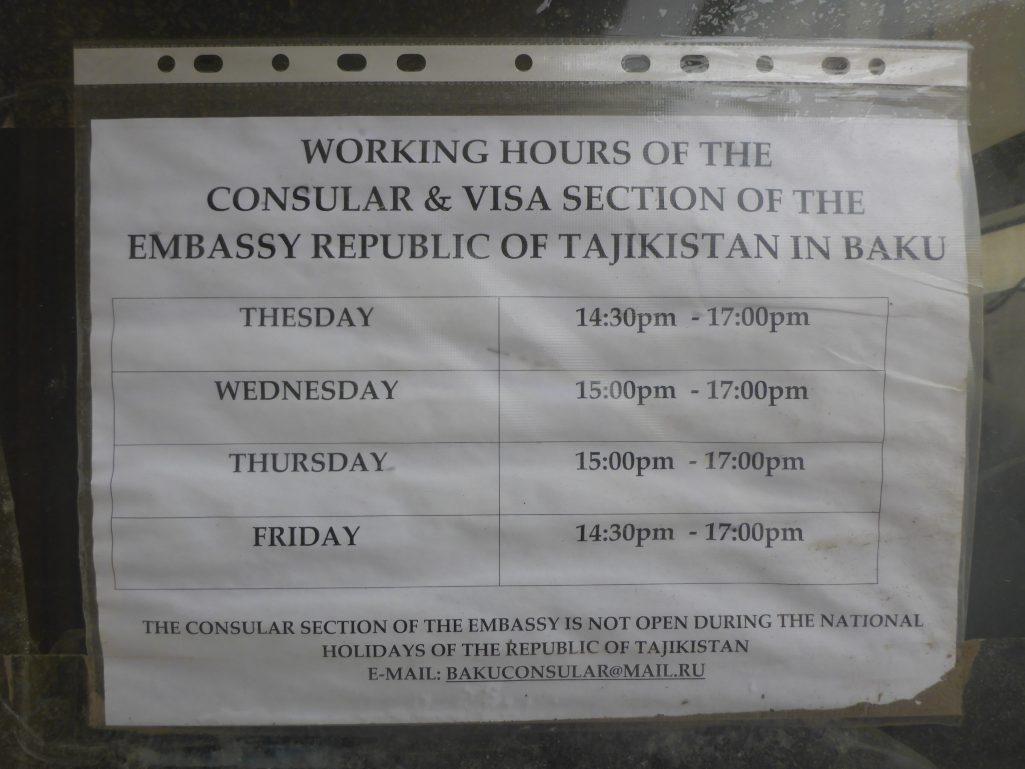
So with a few days to spare we have the whole of Baku to explore. It’s a city of 4 million people and has seen rapid growth after oil began being extracted just off the coast, bringing with it lots of foreign investment and plenty of cash for the government.
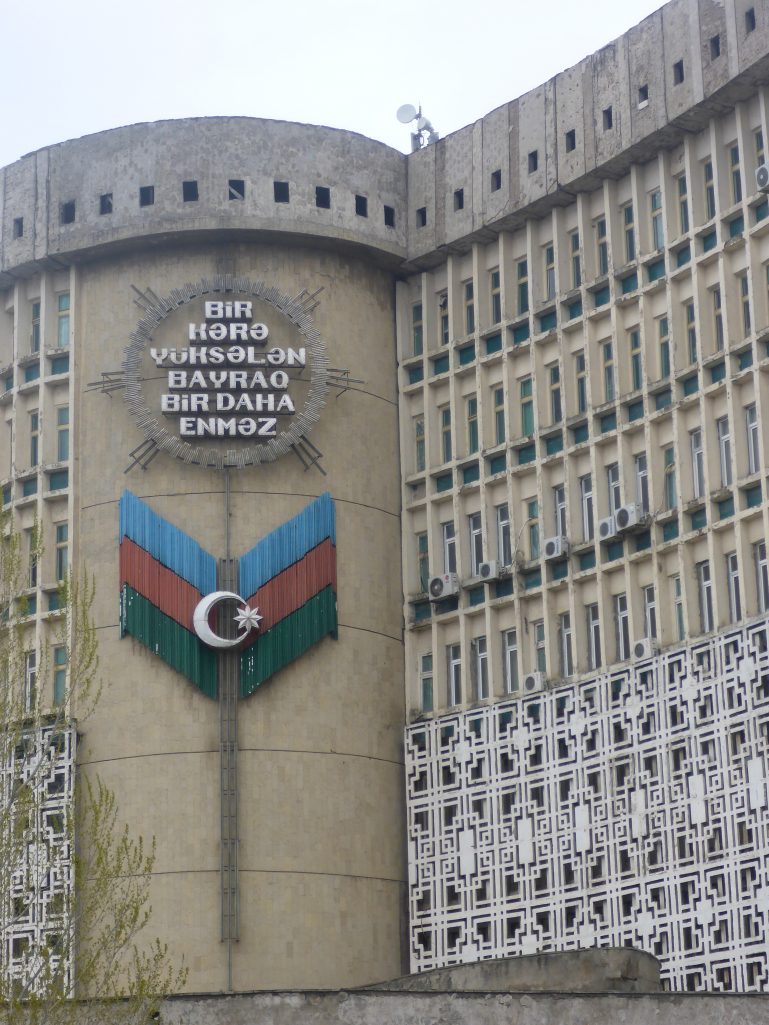
This wealth is very evident with huge and elaborate buildings crowding the skyline, impressive museums, a shiny marble promenade along the seaside and some of the cleanest streets we’ve seen for quite some months (although most of Azerbaijan was largely litter free too which makes for a refreshing change).
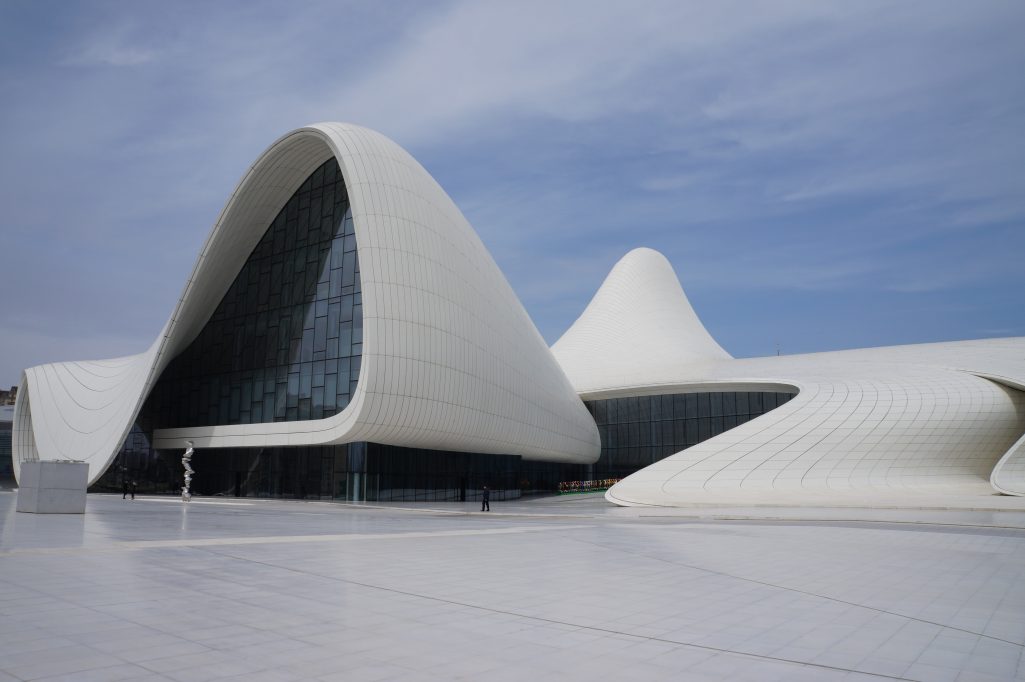
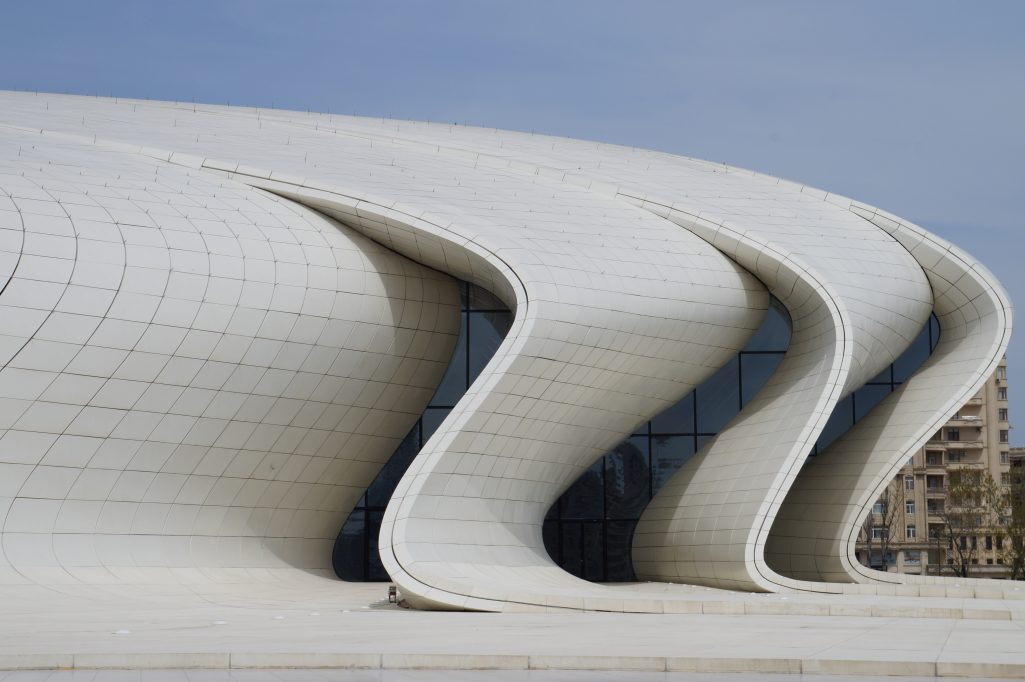
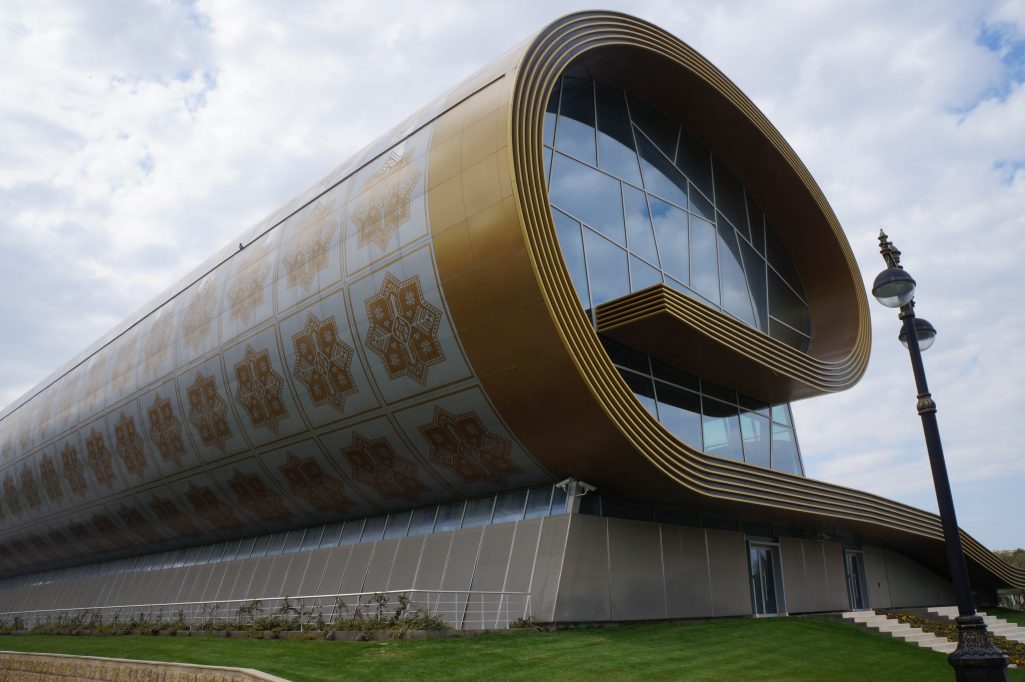

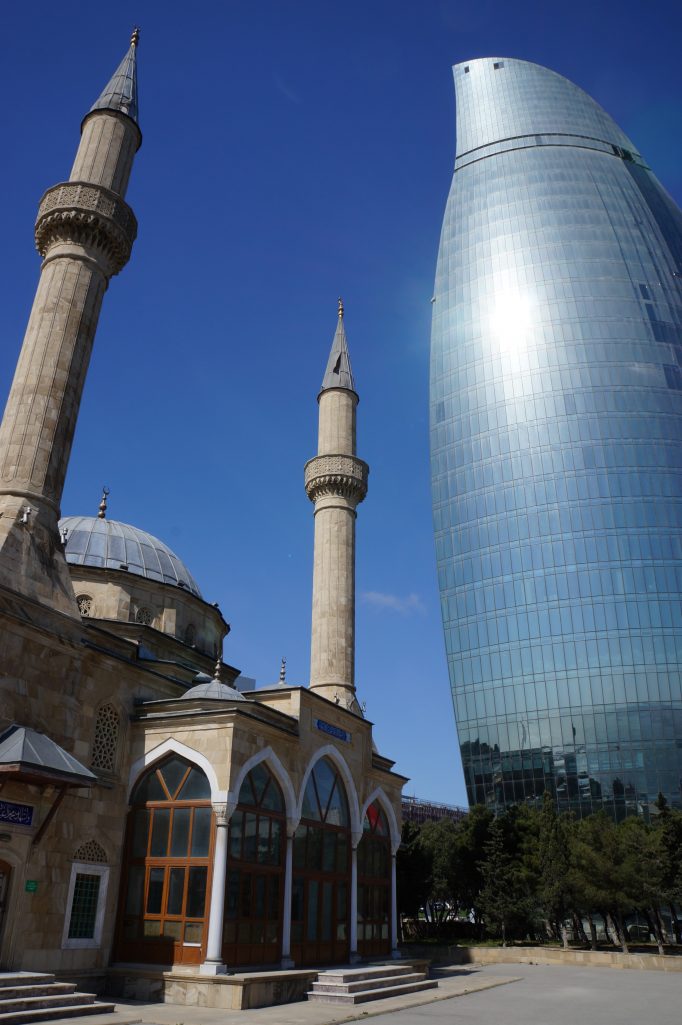
The streets are crammed with vast 4x4s, at least 2 stories high and always fresh from the car wash. Barely reaching their bumpers are a few remaining Ladas but everyone is brought together by a shared love of using their horns. Continuously.

Behind the glitz and glamour there are still a few slum areas but their days are clearly numbered. This summer Baku will host the first ever European Games and the government is keen to present a prosperous image of Azerbaijan. Bulldozers are parked ready to level some of the inner city areas. All routes from the airport and to the venues have been smartened up with new facades on the buildings and walls around the parts they don’t want visitors to see. An entirely new fleet of buses is primed and ready (brand new London Taxis were bought when Baku hosted the Eurovision Song Contest). There are also rumours of street dogs being ‘disposed of’.
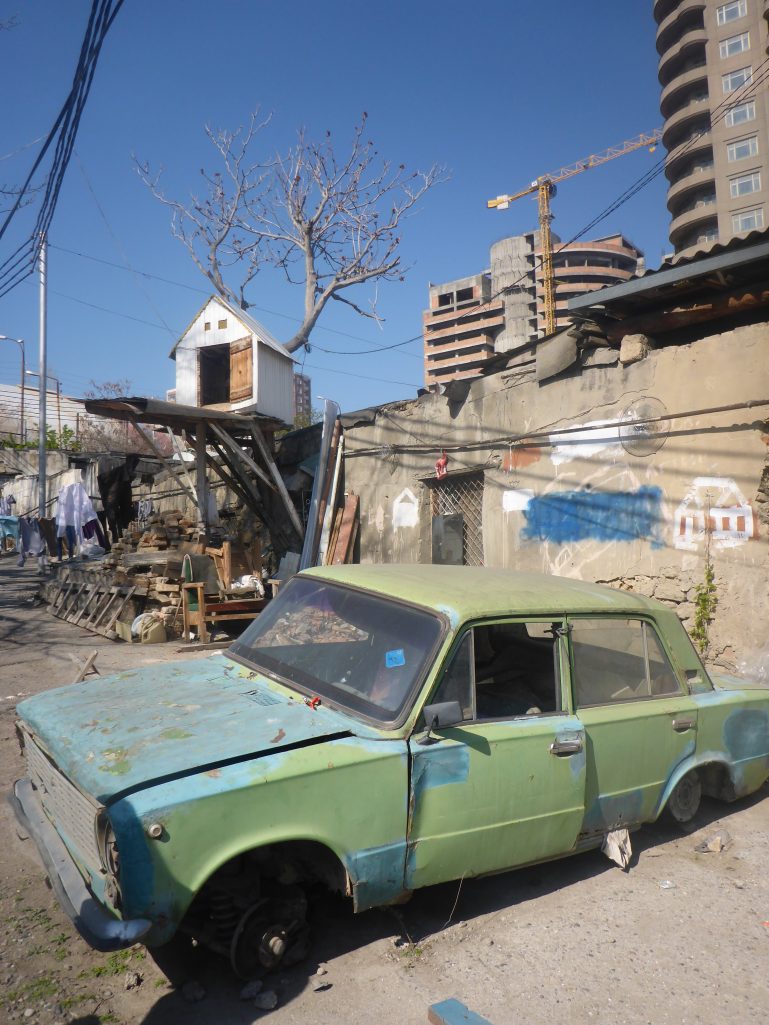
The overall impression is of a strange and false city that bears very little resemblance to the rest of the country that we have seen. It’s also no surprise that Baku aspires to be referred to in the same breath as the mother of all mega-wealthy oil cities: Dubai.
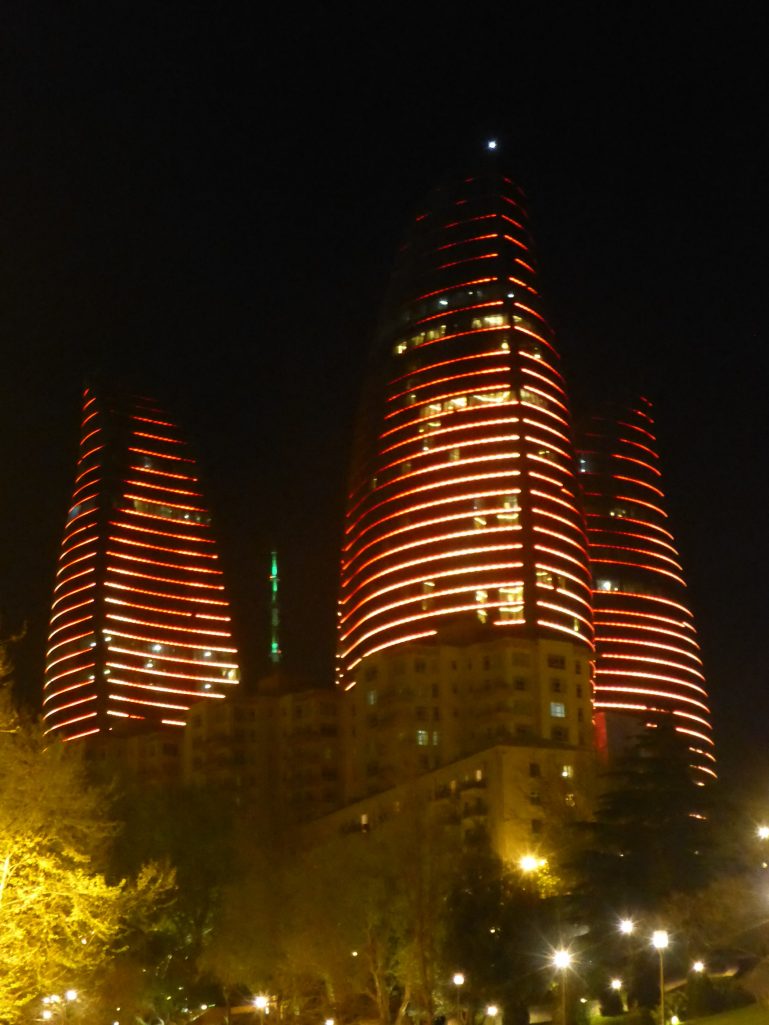
Justin and Jess are great hosts and keep us busy when not visiting embassies by inviting us to their local Hash House Harriers event. The Harriers are a global organisation and refer to themselves as a drinking club with a running problem. There are factions all over the world catering for many ex-pats as well as a few locals who enjoy a bit of running and a lot of drinking. For our first outing we opt for a walk rather than a run followed up by much raucous singing, fun and frivolities that are the trademark of the club. Later in the week I get to pull on a pair of running shoes for the first time in 9 months and discover that absence makes the heart grow fonder by thoroughly enjoying stretching my legs with a couple of the Hashers. Then more liquid refreshments and next day discovering that absence also makes the legs grow stiffer after such a long break from running.
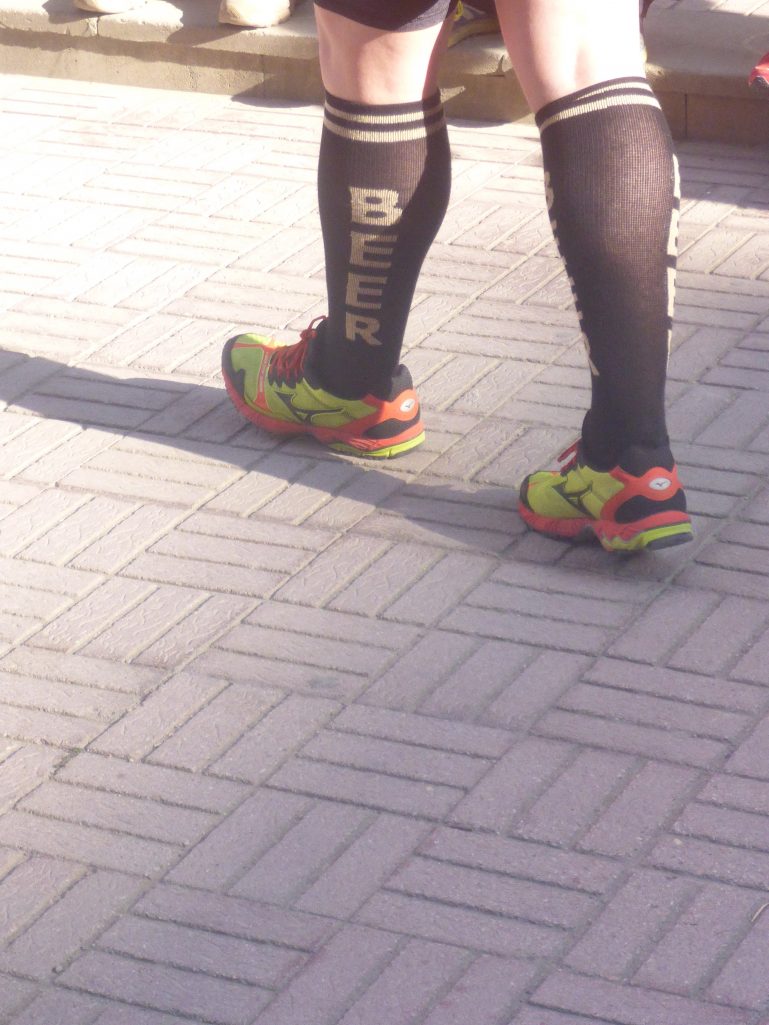
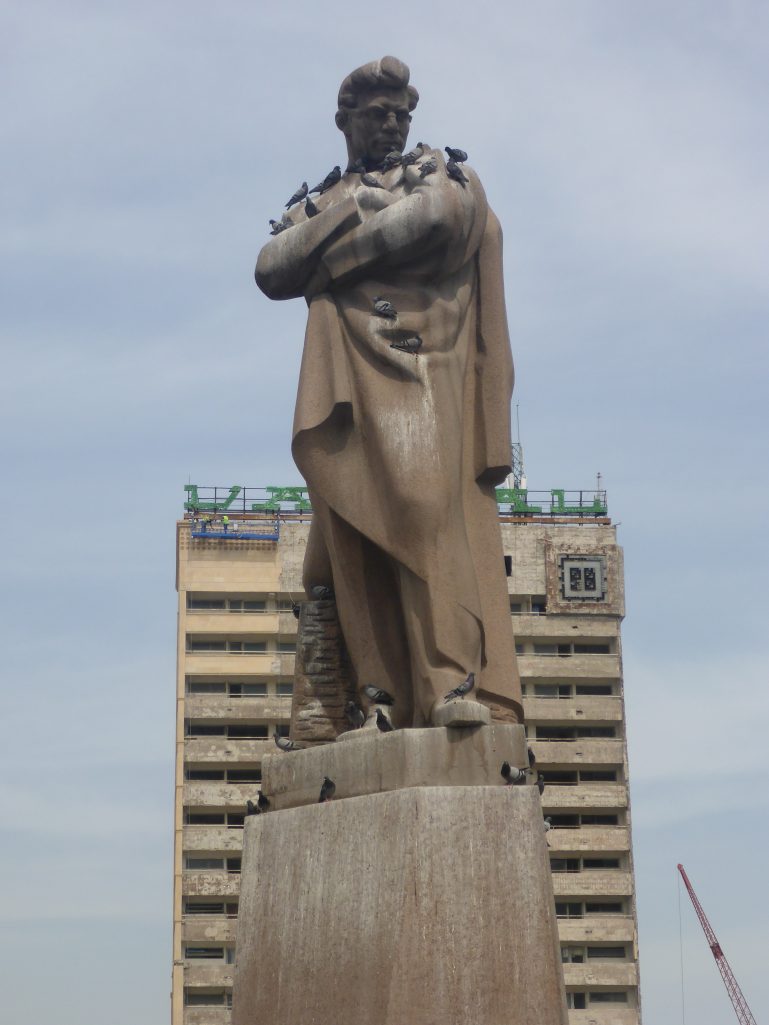
We’ll certainly look up more HHH clubs in some of the cities further along our route as it’s a great way to meet some new people as well as guaranteeing a great night out. I may even get to go for another run.
The Hash has provided Justin and Jess with plenty of friends including some high volume and great value Americans, Steve and Kathleen who invite us all round for dinner and some Southern style catering (hot, brown and plenty of it). They also introduce us to Gafar, a native Azeri who proves to be a very useful contact.
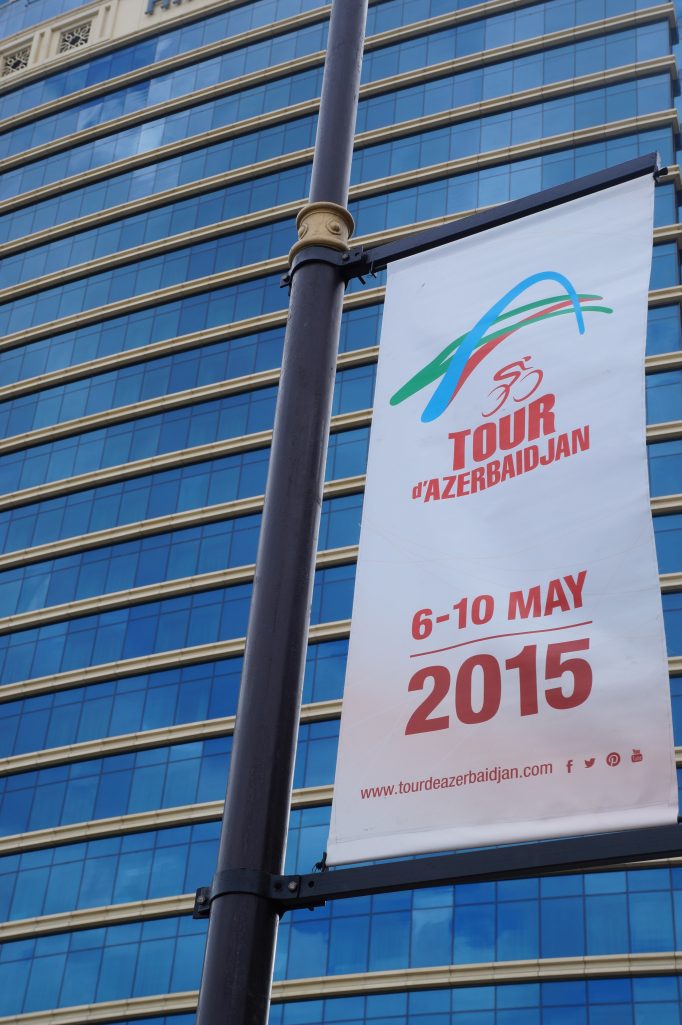
Gafar is also a keen cyclist and suggests that, as we have a spare day, we go for a ride up one of his favourite climbs. He provides a bike and brings his chauffeur driven support van to get us to and from the climb that passes through the Candy Cane Mountains north of Baku.

Having the driver, Emin unload the bike, inflate the tyres and check everything is ready is quite a novel experience. Everything feels twitchy, light and unstable compared to the mighty tandem and it takes a while to stop wobbling all over the road. But I’ve been goaded by Justin to give this climb some welly as there is a record to try and break so I give it my best shot.

We fire up the 1000m hill that is consistently steep and weave up hairpins through acres of trees. The last 12000km of ‘training’ seem to have paid off and it feels good to be riding without the panniers. The record falls by just 1 second but it’s enough to take the King of the Mountains title. I can only imagine how much faster I would have been with Kirsty providing her power on the back too. We celebrate with a fine meal in Gafar’s penthouse suite cooked by his maid. Gafar is a very useful person to know.

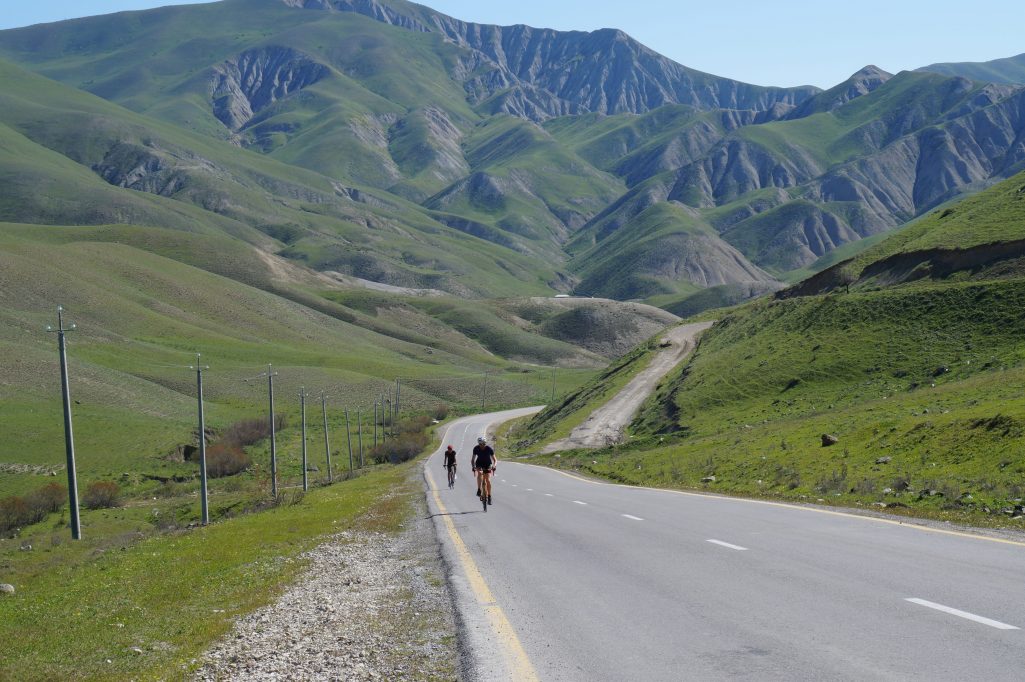
On the 8th day after applying, a call to the Uzbek Embassy results in the reply we are waiting for, our visas are ready. We had already collected our Tajik visas 3 days before and paid in cash there and then. Nice and simple. The procedure for the Uzbek Visa requires a visit to a bank in the centre of town to pay directly into their account, then taking the receipt to the embassy before they then relinquish the much coveted visa.
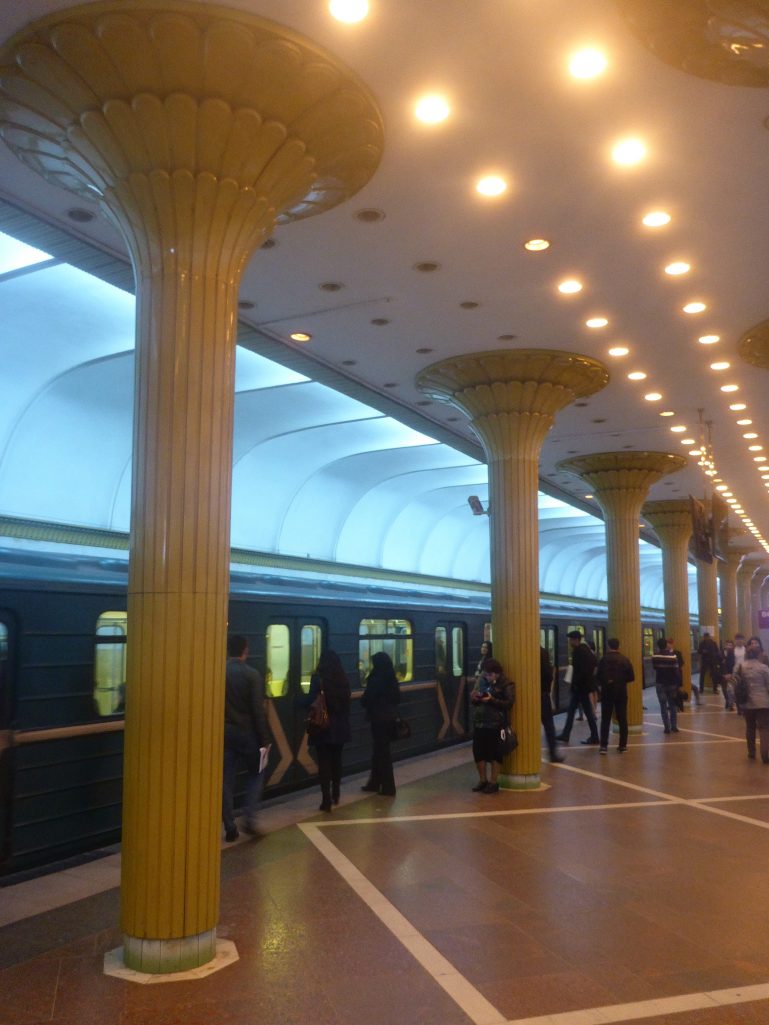
Now we are ready to set sail across the Caspian. This is not a passenger ferry route but there are cargo ships that have a limited number of bunks that tend to be used by Mongol Rally drivers, intrepid backpackers and of course the occasional cycle tourist. The boats do not follow any kind of timetable as their departures are dictated by the volume of cargo that needs to be moved, the weather and the whim of the port authorities. So to find out if and when the boat might leave you need to call, or better still visit, the port ticket office and ask if there is a boat leaving that day and if so if there is room on it for two people and one bike.

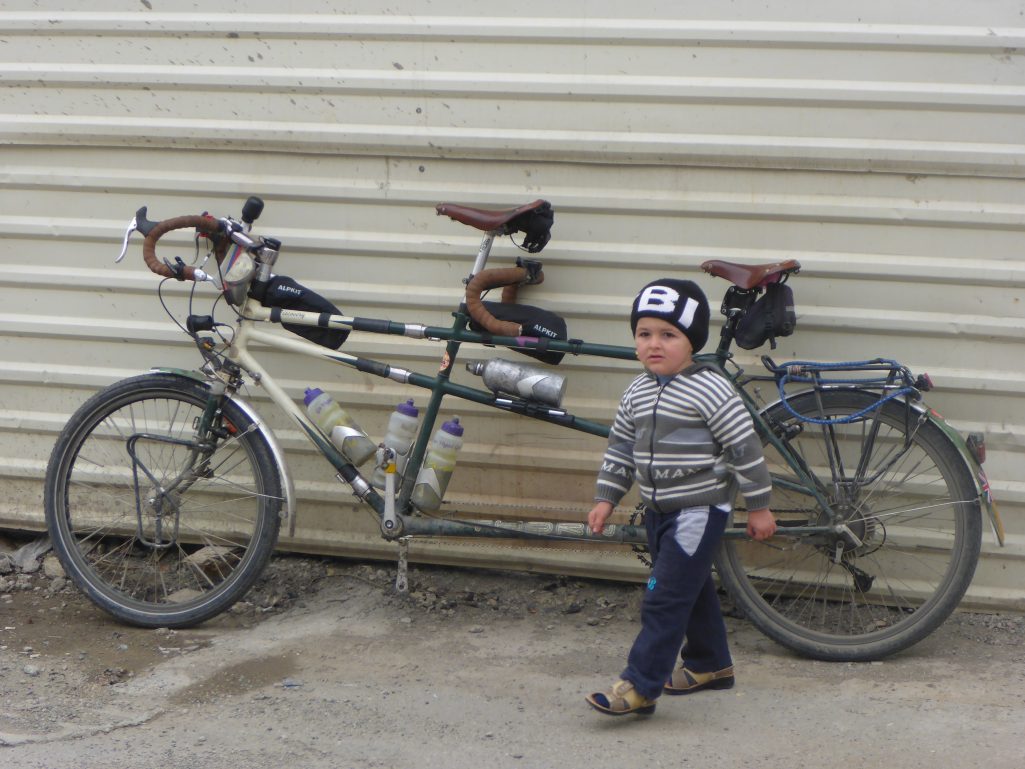
Justin sets one of his logistics experts on the task of arranging this for us as it requires an Azeri speaker but his first candidate tells him that we should go via Tbilisi as this is the best route. That person has since been sacked. The second logistics expert has more luck and after speaking to the ticket office learns that there is no boat today.
On the second day of asking there is also no boat but there may be one the next day.
On the third day Kirsty and I ride down to the ticket office ourselves. It’s not easy to find being 8km East of the city, down an unlikely rough track and behind an unmarked grey door near the main security gates for the port. We sit and wait for it to open at 10am, which comes and goes. At 11am a head appears at the window and tells us to wait for an hour. At 12pm the door opens and they tell us the boat will sail today at 6pm, not from Baku but from Alat which is 70km south of the city. We hurriedly handover the $110 ticket price, grab the tickets and pedal back to Justin and Jess’ flat to collect our bags.
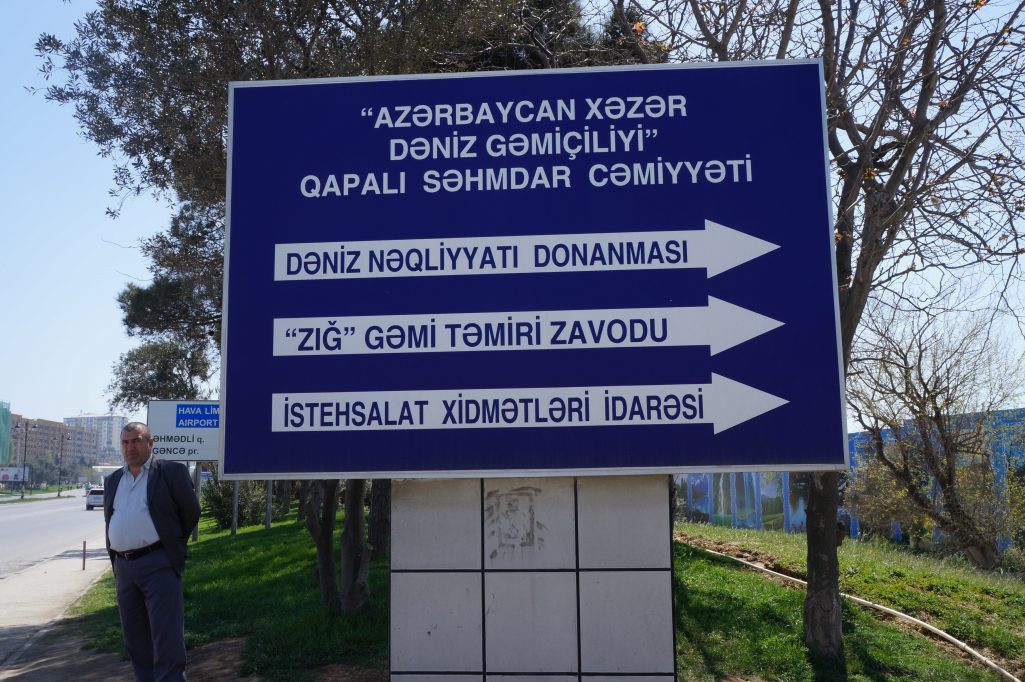
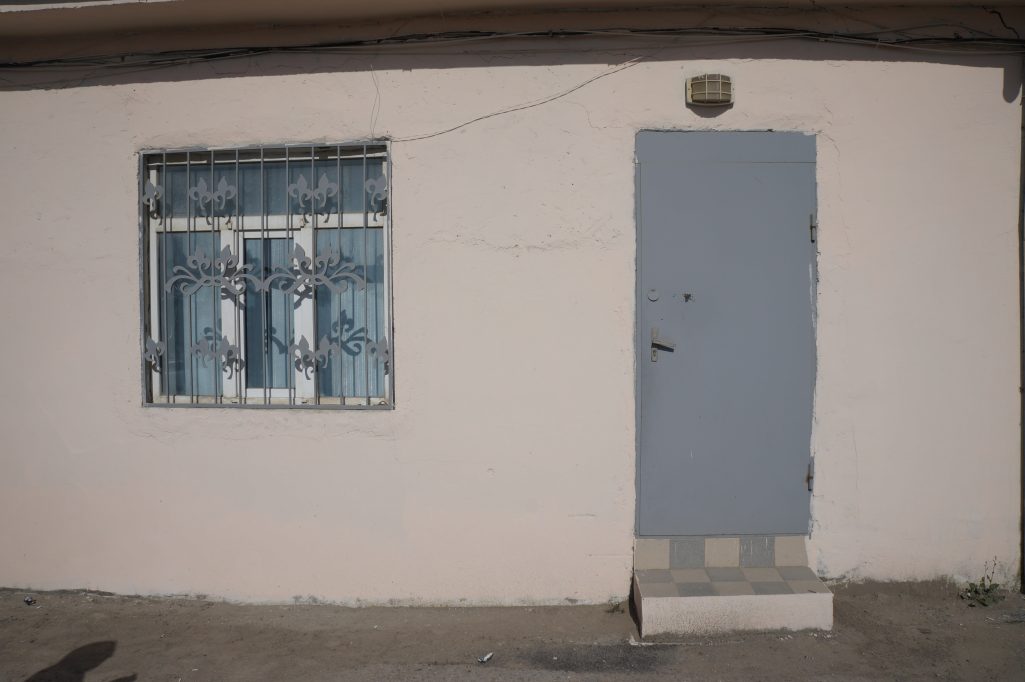

We had anticipated that it might be a bit of a rush so have Gafar’s driver and van on standby to drive us down to Alat. Gafar is a very useful person to know.
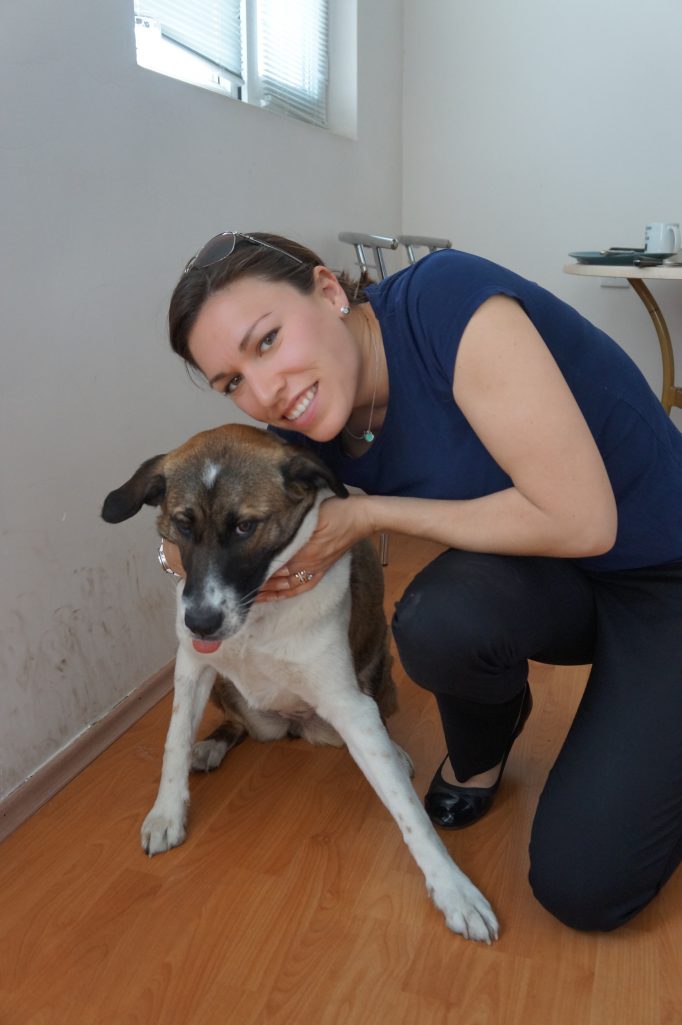
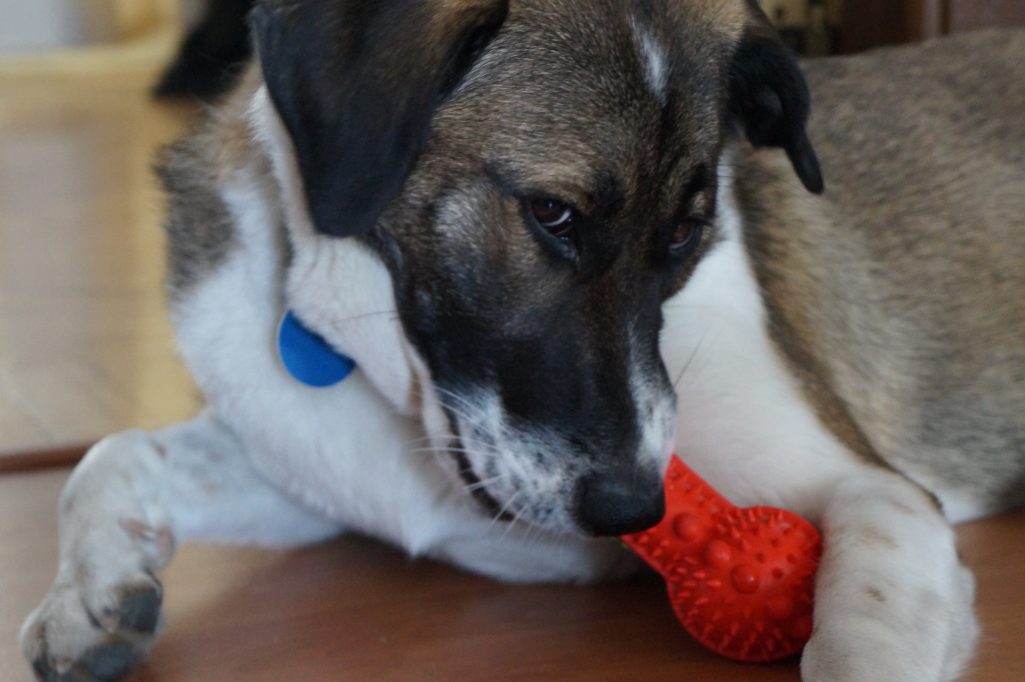
Baku has become a meeting point for cycle tourists travelling across the world and forms a watershed for those heading into Iran (just about everyone) and those heading across to Kazakhstan (Brits, Candadians and Americans). It was no surprise then that we had met two other cyclists at the Tajik Embassy in the form of Rob (allthewayfromstockholm.com) and Josh (joshcunninghamcycling.co.uk) from London. As they were on a similar schedule to us we had agreed to keep in touch with regards the boat. They had also managed to buy their tickets so we all piled into Gafar’s van and headed down to Alat to board the boat.
Alat will one day be Baku’s main port but for now it is a huge building site with a single jetty and a border control office and nothing much else around it for several km. The border guard doesn’t pay us much interest and it’s clear that not much is going to happen for a while so we set ourselves up on the tarmac and wait. With the time I manage to get a swim in the Caspian sea as it looks much cleaner here than back in Baku.

After waiting 2 hours, at 6pm we’re let through onto the boat and I’m the only one to be asked about the registration with immigration control. This is supposed to be mandatory and requires all visitors to the country to register within 10 days of arriving via their chosen accommodation. It clearly serves no purpose other than to allow border guards to hand out a hefty 300 menat (about $300) fine to those who fail to do it. Luckily Gafar had sorted Kirsty and my registrations out for us via one of his hotels. Gafar is an extremely useful person to know.
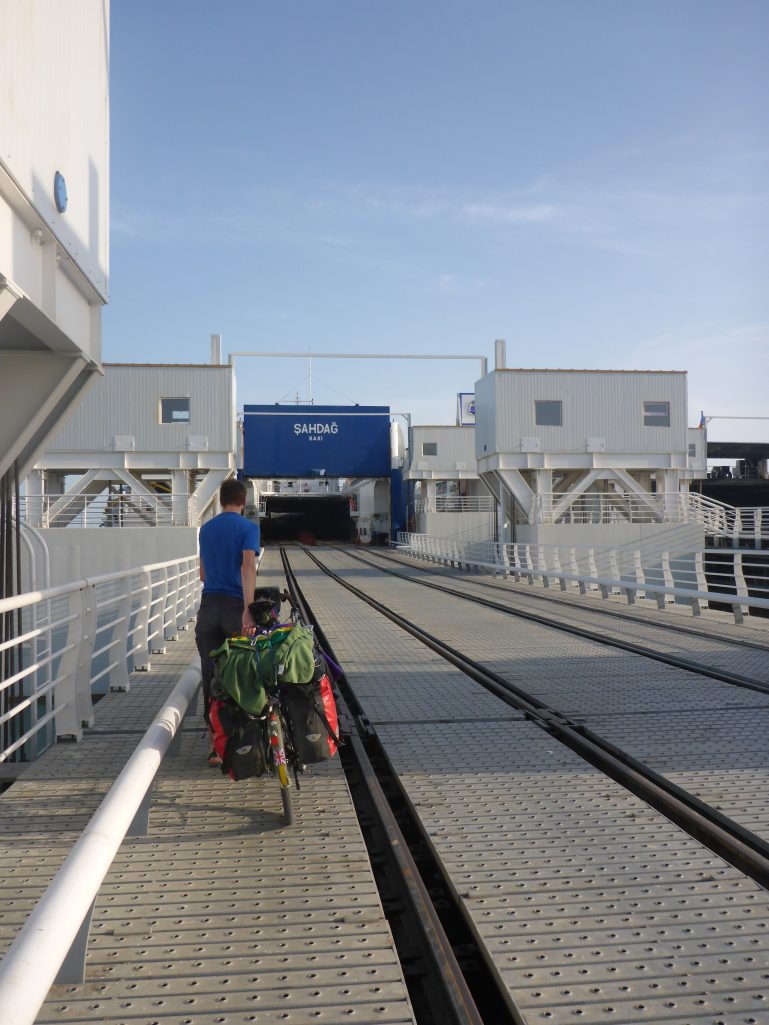
Our ticket price includes a cabin that we all share and then we have free run of the boat so can explore just about everywhere including the bridge, engine room and climbing the radio tower.
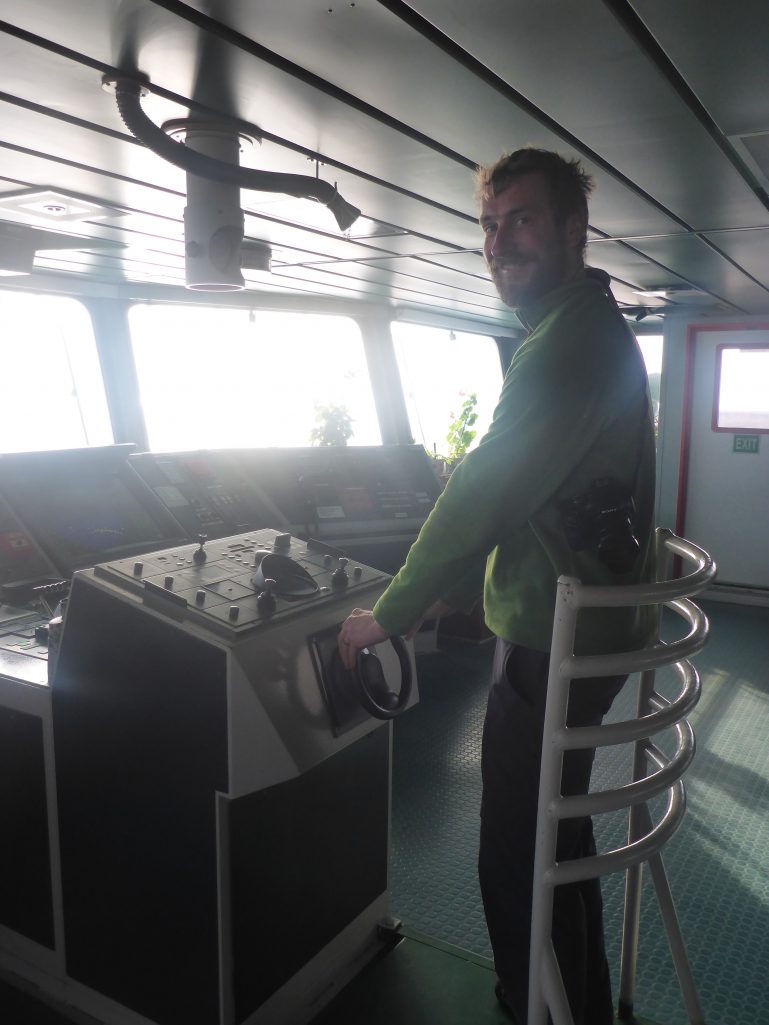
Supper is served at 7:30, again meals are included, then at 9:30 they begin loading the cargo. A lengthy train is slowly wheeled onto the boat which takes about an hour of to-ing and fro-ing before all the carriages are fully on board. Meanwhile we find the volleyball court, midships complete with a ball on a wire to prevent it from going over board. Josh wins 5-0.
Apparently we eventually slipped away from Azerbaijan at 2am but I was fast asleep by then.
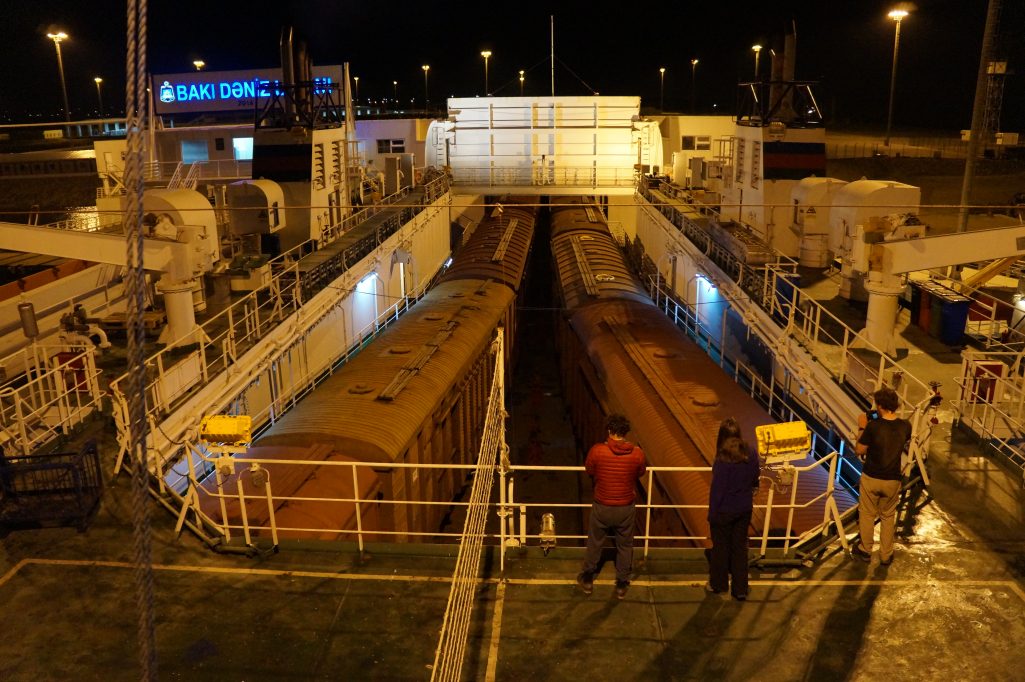
In the morning when I woke up I thought we were still still in port because it was so incredibly smooth. Looking out the window the water is like a mirror, broken only by the ripples from our bow wave.
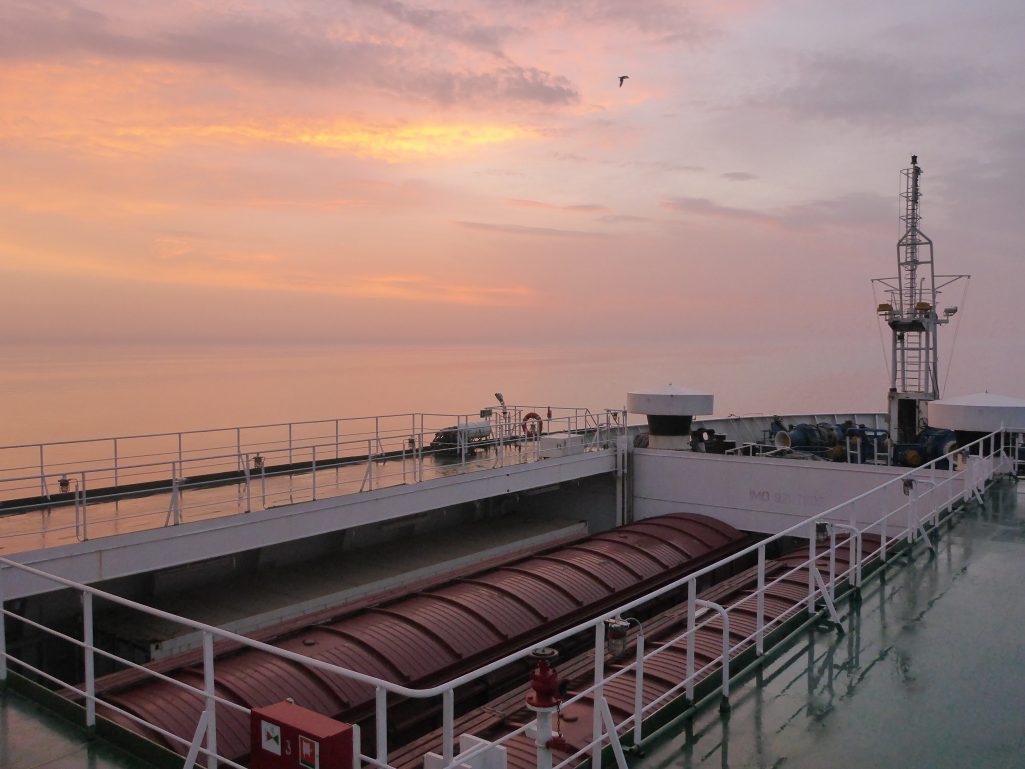
We all scramble out of our bunks before sunrise for what is promised to be something very special. The best vantage point is found to be the top of the radio mast which we take turns to shin up and snap dozens of photos of the glorious blaze of colour as the sun rises out of the sea. The spectacle in the sky being mirrored perfectly in the still calm sea. We’ve seen plenty of sunrises and sunsets on the trip but this is one that will be hard to beat.



The cook is surprised to see us so early and breaks with decorum by allowing us to have breakfast before the captain.
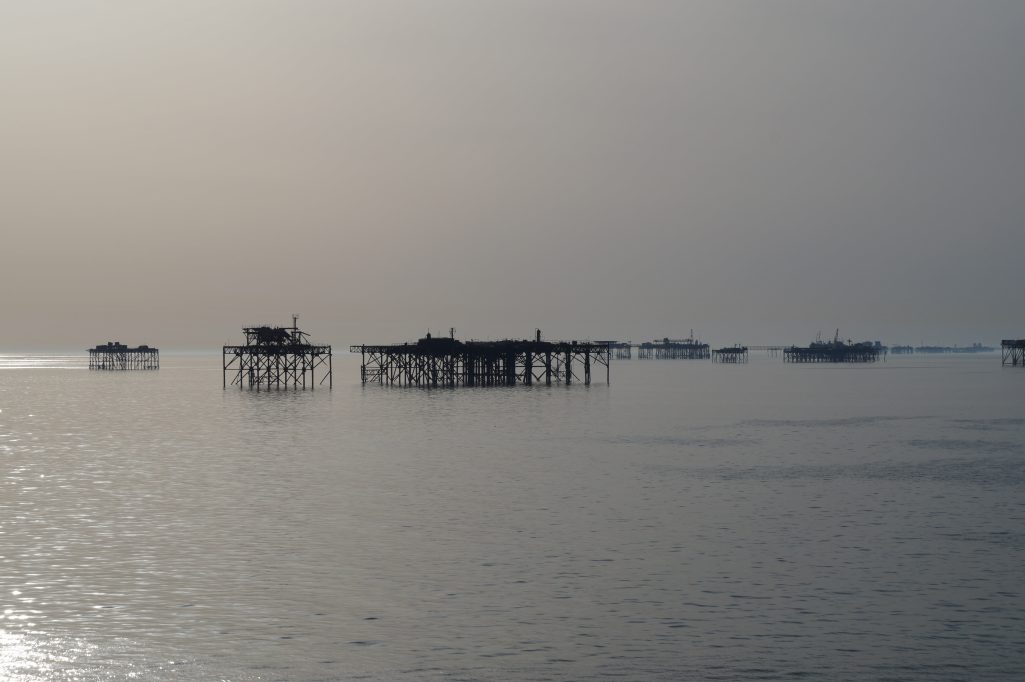

I’d set aside various tasks to keep me occupied during the 30hr crossing the first of which is to service the rear hub on the bike. That’s the only thing that gets done in the end though.
After reassembling the bike again I go and inspect the train and wonder what the cargo is. It turns out to be two Georgian men who are escorting several wagons of frozen chicken, and when they spot me looking up at their carriage they invite me in. It’s about 10:30 so they’re tucking into a late breakfast which, being Georgian, includes bread, cheese and 80% proof chacha. Also being Georgian means that they insist that I join them and offer a toast to my good health.
A few toasts later and I’m sent to round up the others to join in the fun. I’m a little unstable but manage to climb back up to the main deck where I find Kirsty and Josh and tell them to follow me to the train. They look bemused by my big grin.
The chacha gets poured again, more heartfelt toasts are raised, some homemade wine is produced. Rob is finally found and is made to catch up and before long there’s a good old fashioned singsong of Beetles hits.

We’re all back in bed by about 6pm and next thing we know it’s 7am and Kazakhstan is fast approaching in front of us. Despite the crossing being so smooth I’m looking a tad green so I can only imagine the vibrations from the engine and the smell of diesel fuel have caused me to feel unwell.
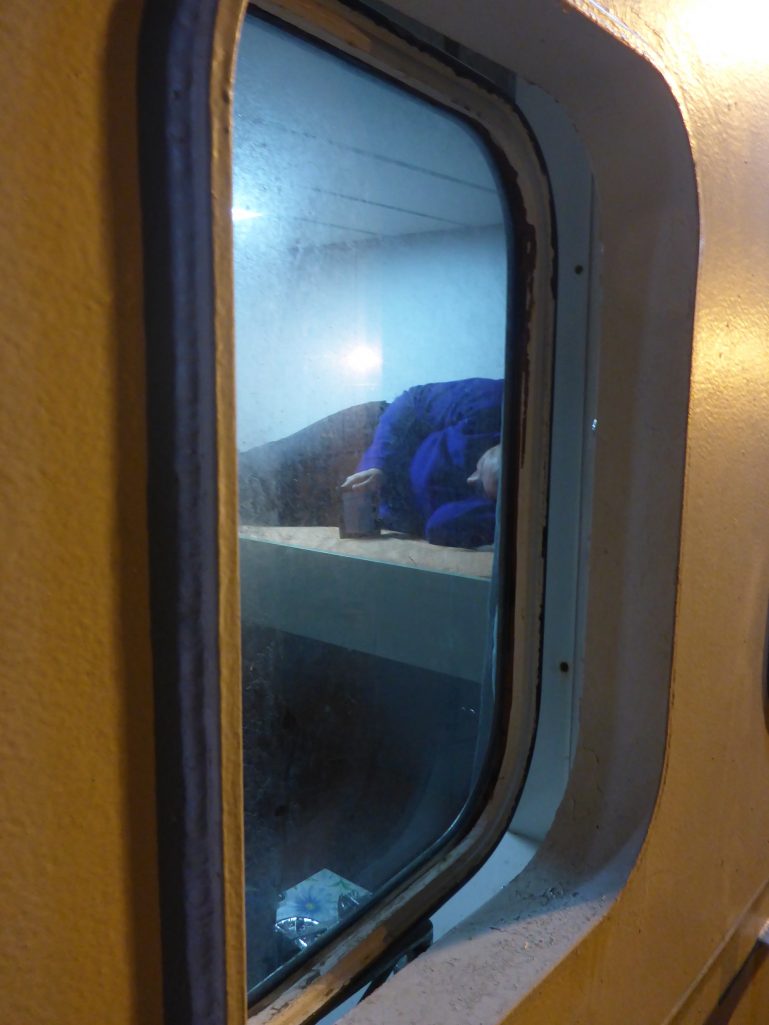
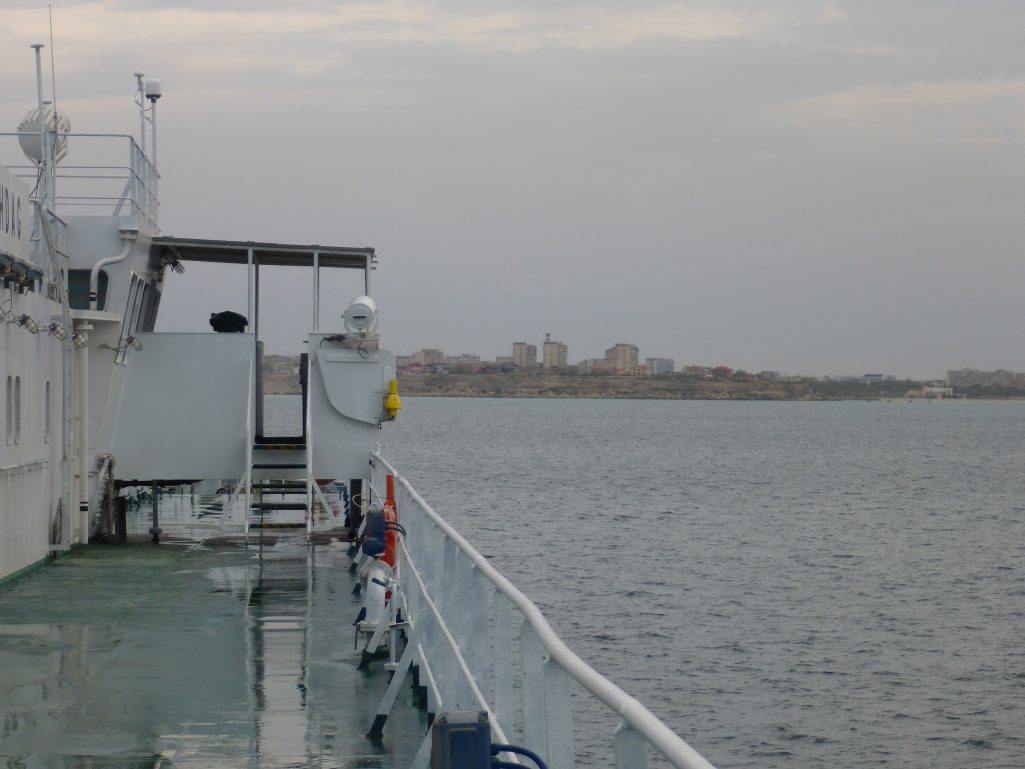
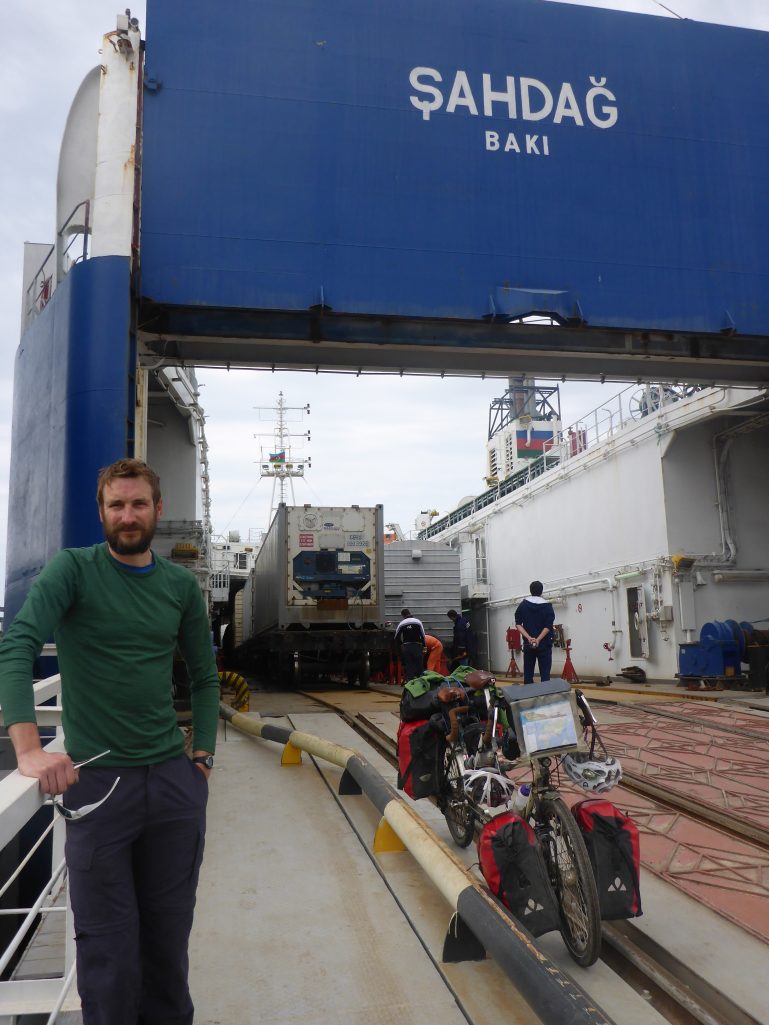
We dock in Aktau at 9am but have to wait for the border guards to come on board before we can leave. I’m just happy to stay horizontal on my bunk for as long as possible. At 10am we’re told to clear off after an armed guard has had a cursory look in the top of our bags and decided he doesn’t want to rifle through cycling kit so gives us the all clear. We’re officially in Kazakhstan at long last!
And so begin our travels in central Asia with a few days in the 300,000 square km of Kyzyl Kum desert to kick things off. The map of the region looks like it’s had tipex spilt on it, there are few roads and most of them end abruptly at a huge white void. We’ve loaded up with plenty of food, have our 10 litre water bag sloshing around on the back of the bike and some new hats to keep the sun off.
Things are about to get hot and sandy.
